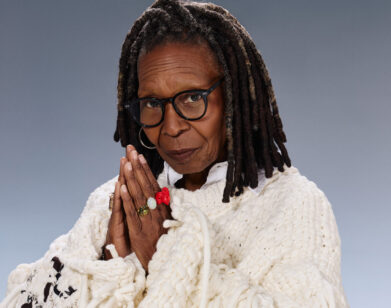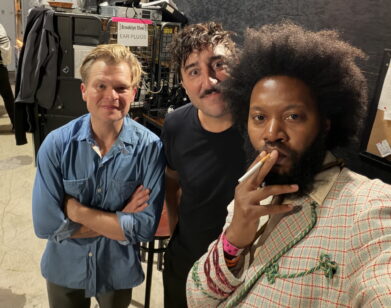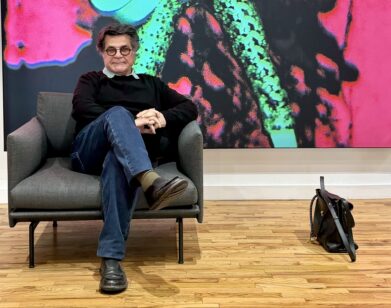friends of the pod
Chris Black and Matty Matheson on How to Master Your Personal Brand
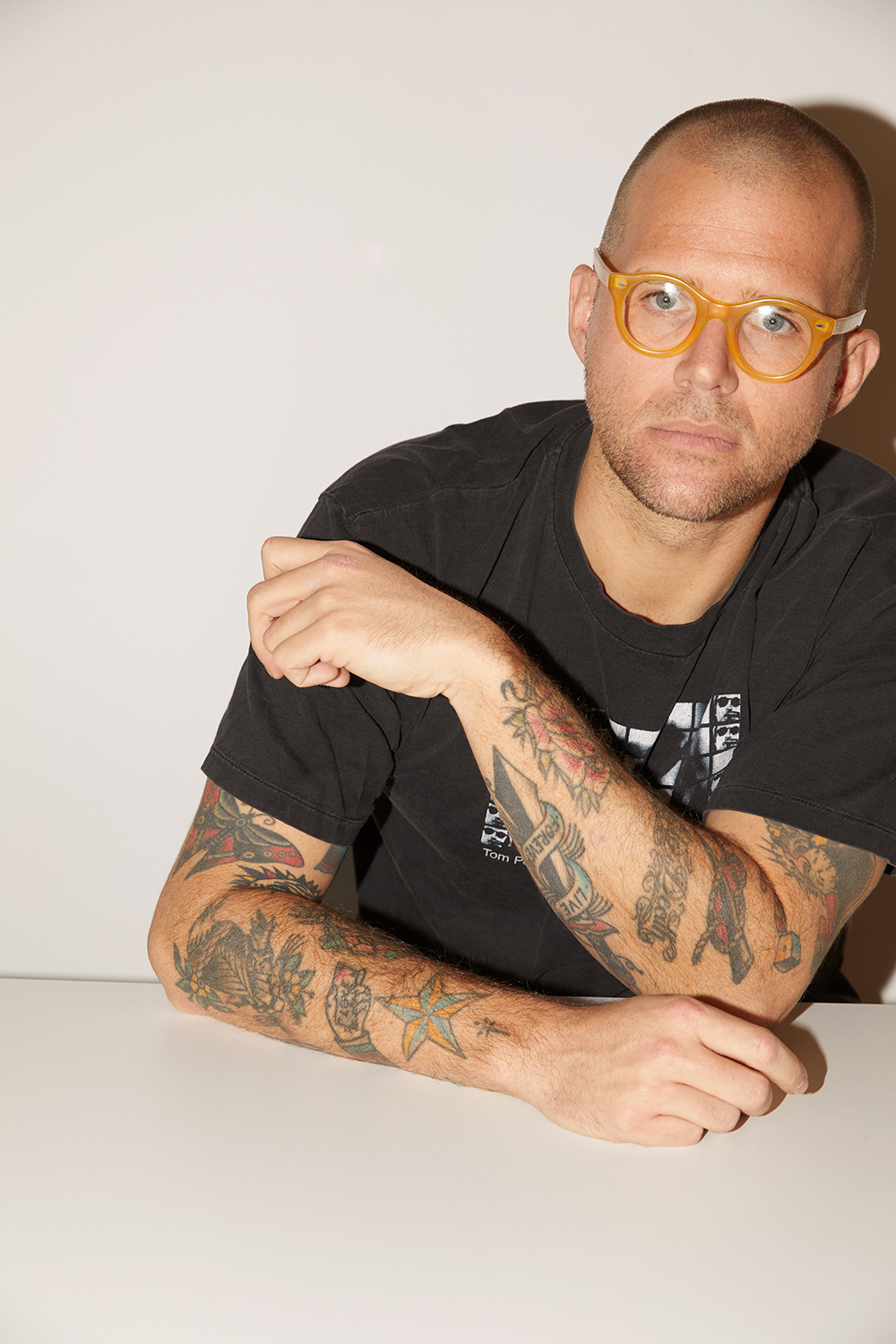
“Does the world need another podcast with two straight, white guys?” the former EDM DJ Jason Stewart asks in the first episode of his podcast How Long Gone, which he co-hosts alongside the writer, creative consultant, and audio veteran Chris Black. “No,” he adds, answering his own question. “But we’re tatted up, we aren’t giving much to the economy, and we’re ready to give you our medium takes.” The result, which was conceived out of early quarantine boredom, is a cult-favorite podcast that covers everything from sneakers to Calabasas to cancel culture. With guests that include comedians (Brandon Wardell, Tim Heidecker), musicians (Rostam, Bauuer), and a whole host of writers and editors—Interview veteran Thom Bettridge, columnist Steven Phillips-Horst, and Editor-in-Chief Nick Haramis among them—How Long Gone fills the silence of our locked down lives. Black caught up with one of the guests on the podcast, the Canadian chef and internet personality Matty Matheson, to discuss AirPods, aging in style, and the art of podcasting.
———
CHRIS BLACK: Okay, big dog.
MATTHY MATHESON: Do you see my architecture? I have architecture posters in frames, okay?
BLACK: That means you’re rich. I get what that means now. What’s up with your hair, bro? What is wrong with you?
MATHESON: I don’t know. It started off as a unifying thing between me and my daughter. She’s two. She does a top she calls a ponetail. She’s like, “ponetail, ponetail.”
BLACK: A top ponetail, I think, is really appropriate for your two-year-old daughter. I don’t know how well it’s going to work for you.
MATHESON: I don’t know what’s happening either.
BLACK: Have you had long hair before?
MATHESON: Yeah, when I went through my folk phase out of hardcore, when I was just like, “Oh yeah, Neil Young’s cool. Let’s do a lot of cocaine and listen to The Band.”
BLACK: We’ve all been through that phase. Unfortunately, Neil Young never really clicked for me.
MATHESON: You’re such an insane person. I’ll tell you one thing. If you want to talk about a great music: Jennifer Castle. If you’re not on the Jennifer Castle tip as a whole, she is the greatest singer-songwriter of the modern day. She used to be a server at a restaurant I worked at in the early 2000s. She did a winter solstice show, a livestream from a venue with just her and two backup singers.
BLACK: I love that shit. I think that COVID has done a lot for the live music performance on YouTube space. I think all the late-night performances have gotten really good, because they’re just giving people a budget to do what they want. It’s more interesting than them playing on Seth Meyers’ set.
MATHESON: And they’re genuinely excited about playing for somebody, where I think a lot of people have just gathered so much resentment towards the entire world right now. It’s going to be crazy, the performances that are going to come out of this. Real creatives are just waiting. They’re sitting back, dialing it in, and just making the most of all of this.
BLACK: It’s going to explode. I’m literally keeping my New York apartment to come back for summer 2021 because it’s going to be so good.
MATHESON: Bicoastal.
BLACK: Dude, you’re used to this. I got back to New York from Atlanta yesterday, and this is the worst snow I’ve seen.
MATHESON: The snow really gets you. It can really fuck you up.
BLACK: I feel like you’re built for it.
MATHESON: I run hot. It takes a lot of windchill to knock this boy down. I have questions.
BLACK: Let’s go, bro.
MATHESON: I’m like, where does the value come from? Why does the opinion matter, right? That’s not even a question. That’s just me saying something. Do you want to speak on that?
BLACK: I do want to speak on it, because I think that the only thing that sets me apart from a lot of other people is the willingness to give a strong opinion and not necessarily waver on that. I think a lot of people are very, “I don’t know. I don’t know if it’s right or it’s wrong.” I’m very decisive in a way that helps me in my career and also on the internet, I think.
MATHESON: People love a truthful opinion.
BLACK: They do. I get killed for it, but it’s more good than bad.
MATHESON: Your Instagram is doorways, plants, tapestries, contemporary abstract art, an old Mercedes, or pictures of a plant in a doorway from the window of a Mercedes. Most people use their IG to promote themselves. You seem to be promoting just a straight goodness. Is that something deeper? I think the imagery that you’re putting out there is just beauty. Most people like myself, I’m a ferris wheel of product.
BLACK: Yes.
MATHESON: I wish I was Jeff Bezos, but not really. But I’m able to monetize myself. What you’re putting up, you can’t monetize that. That is a deeper thing where people go to that and they’re like, “No, that’s the guy, he knows the right doorway. He knows the right tapestry. He knows the right plant.”
BLACK: There’s nothing I love more than photographers and real photography. That is truly what I love. That’s what a lot of my friends do. That’s why I spend thousands of dollars on books. So, this is my only way to even be #amateurshutterbug. I think that’s what I always used it for. Whereas, who wants to see a picture of my face? I don’t really know what good that would do for me.
MATHESON: They’d be like, “There’s another guy that looks like that.”
BLACK: Exactly. There’s another guy who looks like a podcaster. I want to prevent that. I also think because I use Twitter the way I use Twitter, which is so much more personality-driven, that Instagram is more of a thing that I’ve always used in that way. It allows me to have those interests.
MATHESON: Great answer.
BLACK: I feel like I’m on 60 Minutes.
MATHESON: What attracted you [to punk] at first? What was the first punk band? Or did you see a style in a magazine where you’re like, “Whoa, those fucking people look interesting”? Did your eye or your ear get grabbed first?
BLACK: Surprisingly, my ear. I think it was literally an Operation Ivy situation. I had a friend, my business partner, James Ellis, he moved from Richmond, Virginia to Atlanta. We met each other in middle school. He had been turned on to punk from people he knew in Richmond, so he brought it to me. And then, we started going to shows and discovering what was in our backyard pretty soon after that. Operation Ivy is a great example. That shit holds up. I can put that on right now. I think that the fact that that exists and I can listen to that 30 years later is a testament to the staying power of a lot of that stuff.
MATHESON: And Tim [Armstrong] looks cooler than ever.
BLACK: That’s the thing. I never had a Mohawk. I never wanted any of that, but I thought it was very cool. Being that extreme and that sure of yourself is a very attractive quality in someone.
MATHESON: I got into hardcore through metal. And then I found punk through metal. It’s so funny. My sister is ten years older than me. Her boyfriend at that time had a tape with Deicide, Pantera, and Cannibal Corpse. Real shit.
BLACK: I think the interesting thing about metal is that I personally don’t like the iconography of it even though I know it’s iconic. Does that make sense?
MATHESON: I’m starting to really understand you. You like exactly what you like. You’re not liking because people are. To say that you don’t like Neil Young is being like, “The sky isn’t blue.” You’re being like, “The Earth’s flat, motherfuckers. Suck it up.”
BLACK: This is something that’s really interesting to me about The Grateful Dead and that whole trend. I don’t like the music, but the iconography is incredible. It’s probably the greatest of all time from a single artist. Being able to understand that and separate it from the music is what you learn as you get older. You can like different things about this stuff without having to be all in on it or all against it. I think that’s maturity.
MATHESON: Who was the first man that you were truly attracted to through style?
BLACK: Oh, fuck. That’s a really, really great question.
MATHESON: It is. I thought of it. Dudes never talk about this stuff.
BLACK: Unfortunately, it came later in life for me, but it’s probably Glenn O’Brien, to be honest with you. To me, Glenn O’Brien and his style and his life and what he was able to do, that’s really attractive to me and something that I feel like I could maybe emulate. But that didn’t happen until my early twenties.
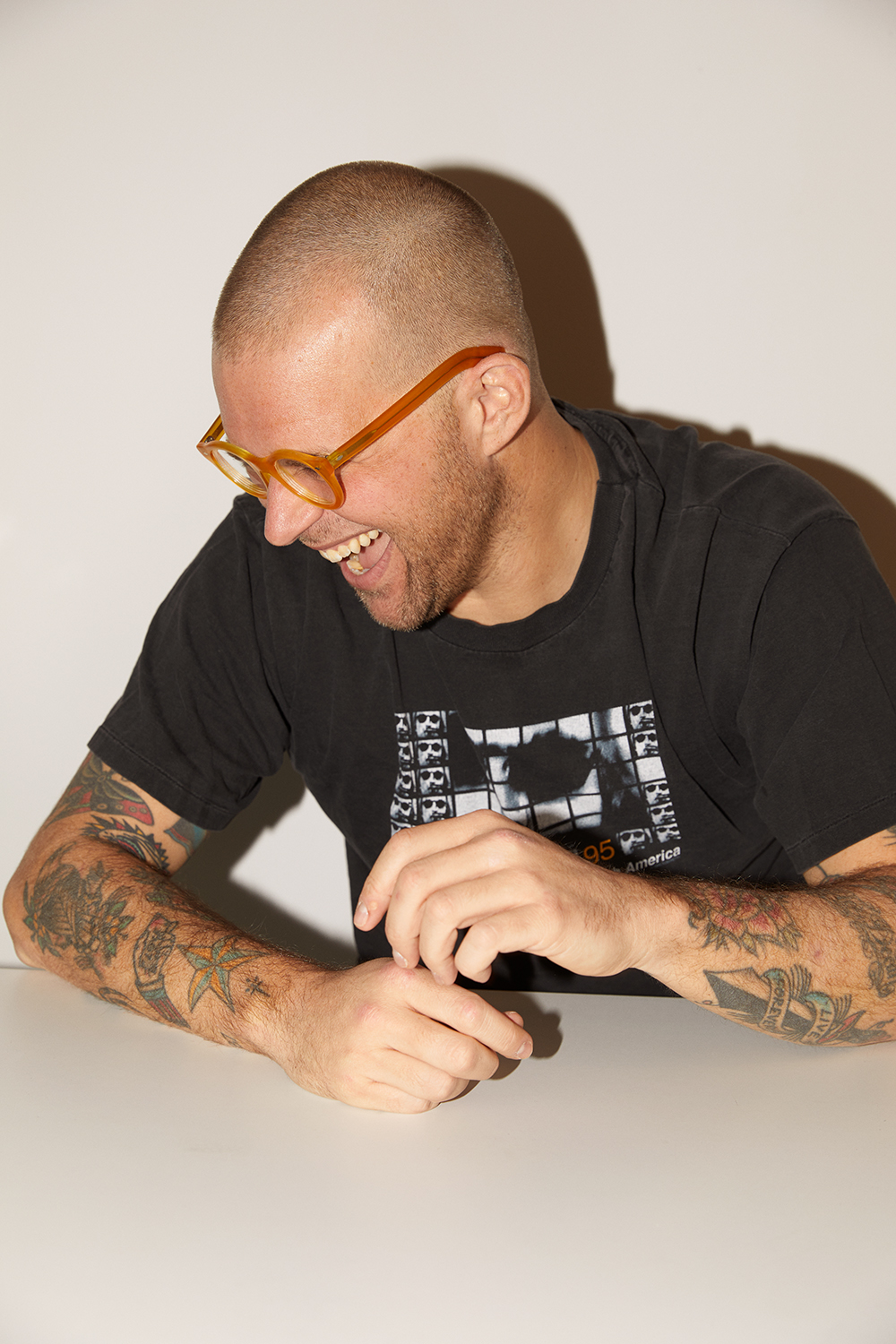
As you start to get older, that’s what you think about. It’s like, how can I carry myself, what can I wear, who can I be that feels authentic to me but also feels age-appropriate? I’m sure you suffer from this, too. I’m friends with a lot of people who are a lot younger than me. You want to understand that and be a part of it, but you also need to recognize like, no, I’m the elder here. I need to carry myself in a different way.
MATHESON: I think about holding court in a certain manner, but I do it through a mentality, because I dress like a buffoon. That’s part of my thing. I want to look like a caricature of myself. I really want to just constantly look like a wrestler from the ’80s that just got out of Mack truck.
BLACK: You’re achieving it.
MATHESON: I feel it. Now, if clothes make the man, why is blue jeans and a white tee still the greatest look of all time?
BLACK: Because I think there’s something inherently masculine about that. I realized this when I shaved my head during the pandemic. I think there’s just a brutal honesty to that look. Let me equate it to something food-related. It’s like the classic margarita. There’s nowhere to hide. If your margarita is good, then I’m going to trust you, because that’s the simplest ingredients to make the best thing. Shaving your head, wearing a white T-shirt, wearing 501s, there’s nowhere to hide. There’s just in that.
MATHESON: What was your biggest fashion misstep, and how long did your worst fashion look last?
BLACK: I had a huge beard in 2012, and that lasted longer than I would like it to have, unfortunately.
MATHESON: Did you have a fedora?
BLACK: God bless, no. I actually looked as bad as I think I did. I also weighed more, so once I discovered my jawline, the beard is gone. Once I found the jawline, there ain’t no reason to hide.
MATHESON: If you were a piece of furniture, what would you be?
BLACK: I want something sexy and chiseled but also comfortable. Maybe I would have to be a Restoration Hardware cloud couch like the Kardashians have.
MATHESON: I think I agree. How long have you known Them Jeans?
BLACK: I’ve known Them Jeans at this point maybe 15 years. We’ve known each other a long time through nightlife stuff.
MATHESON: And then, what pushed you to doing three podcasts a week? A lot of people don’t understand the amount of mental taxation it takes on you to do that, to speak clearly and to be funny and to be on point and to be mentally ready to do that hour-and-a-half. What sparked you guys specifically doing it together? Because it just seems like two regular white guys…
BLACK: Well, it is. He had a podcast called Tall Tales that was very ahead of its time for years and years before podcasting really exploded, and I had a podcast called Public Announcement that we approached NPR-style, with serious editing, sound beds, producers, etc. Both of those things came to a natural end. We talked to each other all the time. We’re very close friends. And then, when the pandemic hit, it was just like, fuck it, let’s do it. We also didn’t have many expectations for it. And now that we’re locked into that cadence, I really like it. I like talking to people. It’s a true interest of mine. I think it’s something we’re missing during COVID, and I’m filling that hole with the podcast. We’re making friends. Look at me and you.
MATHESON: So, you started the podcast to meet me?
BLACK: I was like, I need to meet celebrity chef Matty Matheson and I don’t know how else to do that. Even though with all our thousands of friends in common, I think I need to commit more to get him into my personal network. But I think that Jason and I really like doing it. It comes very naturally to us.
MATHESON: It’s really great. You guys are really good at it.
BLACK: I think that we approach things in a pretty open and honest way. Whether it’s music or clothes or food or fitness, we talk about all that stuff a lot, because this is what people are actually interested in. This is what people actually want to talk about. The doomed American political system, the novel coronavirus, what’s going on with Brexit, those are things we can read about and actually learn from smart people, but if you want to just have fun and feel like you’re talking to your friends, that’s what we’re trying to do. This is what people are actually interested in and actually want to think about to make themselves feel better. It’s really that simple.
MATHESON: Who has been the biggest get?
BLACK: Dashboard Confessional, bro. It’s been a different world. A lot of it is writers and media people. Jeremy O. Harris, who’s a playwright, or Molly Young, who’s a writer, or Tim Heidecker, who’s a comedian, or Matty Matheson, a world-famous, very important chef, or Dashboard Confessional or Rostam…
MATHESON: It’s very eclectic. It’s actually pretty surreal.
BLACK: That’s the idea. We want to have the biggest group of people, and we want to have those conversations and make it easy for them to open up and have fun and share that. That’s really what it is, Matt. It’s that simple.

